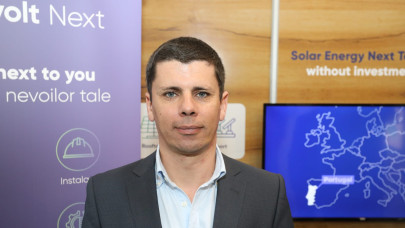Moldova's renewable energy strategy is a crucial step toward energy independence and sustainability. The country's energy landscape has shifted considerably since 2022, following the conflict in Ukraine. As a result, Moldova rapidly connected to the European energy system and reduced its reliance on Russian energy supplies.
The capital, Chișinău, is at the forefront of efforts to boost green energy production, marking a significant shift in the country's energy policy. The Moldovan government recognizes the importance of energy security, and renewable energy is seen as a key solution to achieving both independence and a greener future.
Moldova's 2030 Renewable Energy Targets
By 2030, Moldova aims to produce at least 30% of its electricity from renewable sources. The government has also set a goal to reduce greenhouse gas emissions by 70% compared to 1990 levels. As part of this strategy, Moldova is set to join the International Solar Energy Alliance (ISA), aligning itself with 98 countries committed to expanding solar energy production.
In addition to these goals, Moldova has secured significant external financing, including tens of millions of US dollars from the European Bank for Reconstruction and Development (EBRD) and the U.S. Agency for International Development (USAID). This funding will support the construction of 300-kilometer energy interconnection lines with Romania, enhancing Moldova's national energy system's reliability and import/export capacity.
Since March 2022, Moldova's electricity system has been operating in parallel with Romania's, following the implementation of new infrastructure that has strengthened the security and reliability of the national power grid. This development has also increased Moldova's capacity for electricity imports and exports through the Moldova-Romania interconnection, enhancing the overall stability of the energy supply.
Auctions and Business Opportunities in Renewable Energy
Moldova is also opening its renewable energy market to large-scale investors through a series of tenders for renewable energy projects. The Ministry of Energy in Chișinău has announced that offers for these tenders will be accepted from September 2024 to January 2025.
The Ministry has implemented measures to facilitate investor participation, including prioritizing connection approvals for large-scale renewable energy producers who win the auction. Additionally, new legislation is being developed to ensure competitiveness and efficiency in the approval process.
"Not all investors will have the necessary connection approvals when they submit their auction bids. As an initial solution, we will prioritize granting connection approvals to large eligible producers who are selected as winners of the auction," said Carolina Novac, State Secretary at the Ministry of Energy.
"Additionally, when new connection approvals become available, these producers will be placed at the top of the waiting list." In the long term, the Ministry of Energy plans to amend the electricity legislation to introduce a guarantee of good execution — capacity reservation — as a requirement for obtaining connection approval.
"This provision is necessary to ensure both competitiveness and the proper organization of the process," Novac emphasized.
In 2023, the Ministry made significant changes to the promotion of renewable energy. The government introduced three key support mechanisms for green energy producers, guaranteeing the purchase of surplus energy delivered to the grid, helping them recover their investments:
Net metering was replaced with net invoicing on January 1, 2024, applicable to small producers with installations for personal consumption. A fixed rate for 15 years is available for photovoltaic plants up to 1 Megawatt and wind farms up to 4 Megawatts. A fixed price, also valid for 15 years, applies to photovoltaic plants larger than 1 Megawatt and wind farms larger than 4 Megawatts.
"We protect consumers by securing the best possible price while ensuring that investors receive the compensation they expect based on a competitive process," said Victor Parlicov, Minister of Energy.
Investing in Moldova's Renewable Energy Future
With the recent tender announcements, Moldova plans to add 105 MW for wind farms and 60 MW for solar parks to its current installed capacity. The capacity limit for obtaining prominent eligible producer status is set at 4 Megawatts for wind projects and 1 Megawatt for photovoltaic projects. The ceiling price has been established at €77.88 per Megawatt-hour for wind energy and €86.7 per Megawatt-hour for solar energy. The guaranteed fixed price will be determined through the auction process and cannot exceed the ceiling price of MDL 1.5 per kilowatt-hour for wind energy and MDL 1.67 per kilowatt-hour for solar energy, as set by the National Agency for Energy Regulation (ANRE), the central authority responsible for regulating and overseeing Moldova's energy sector.
Moldova has significant renewable energy potential, with estimates of 20,868 MW for wind energy, 4,648 MW for solar energy, 840 MW for hydro energy, and 850 MW for biomass. While maximizing these resources could allow Moldova to meet nearly all its energy needs during peak hours, the current gap between potential and actual green energy production is partially covered by import purchases from diversified sources: Romanian Energy and Gas Market Operator (OPCOM), Romania's Hidroelectrica and Nuclearelectrica as well as Ukrhydroenergo from Ukraine through the state-owned company Energocom, Moldova's central electricity supplier.
By 2023, Moldova had achieved 348.3 MW of renewable energy capacity (132.7 MW of wind power, of which 115.3 MW net metering, 6.9 MW of solar power, 16.8 MW of hydropower, and 6.6 MW from biogas), and with the addition of 165 MW from the new tenders, the total capacity will reach 513.3 MW, bringing Moldova closer to meeting its daily energy production needs.
Export Opportunities for Renewable Energy Producers
Moldova's renewable energy producers are not limited to the domestic market and are not obliged to deliver electricity solely to state-owned Energocom. Many producers have sold electricity to Ukraine and Romania, taking advantage of competitive prices in neighboring countries.
"This summer, Moldovan producers sold energy on the stock exchange to Ukraine and to consumption partners in Romania. This is the commercial market; you produce a good and want to sell it at the highest possible price," said Victor Binzari, Director of Energocom.
He added that the capacities announced for bidding in Moldova are critical in the current situation.
"According to the regulation, Energocom is obliged to buy green energy produced by investors. More energy produced in the country means less energy purchased from Moldgres [Moldova's primary electricity producer, operating on Russian-supplied gas and located on the left bank of the Nistru River]. We no longer buy energy from abroad; instead, we buy energy produced in Moldova," he concluded.
With the expansion of its renewable energy infrastructure, Moldova is reducing its dependence on external energy sources. Energocom is committed to purchasing domestically produced green energy, reducing the need for imports and boosting national energy production.










